7th renmin university-glo annual conference on low fertility and population ageing held at renmin university of china
november 13, 2024the 7th ruc-glo annual conference, jointly organized by the school of labor and human resources at renmin university of china (ruc) and the global labor organization (glo), was successfully held at the lide building of renmin university of china from november 9th to 10th, 2024. the theme of this year’s conference was “low fertility and population ageing.” a total of 16 scholars from institutions such as singapore management university, peking university, tsinghua university, renmin university of china, shanghaitech university, east china normal university, hunan university, jinan university, university of international business and economics, southwestern university of finance and economics, liaoning university, and zhejiang university of technology presented their latest research.
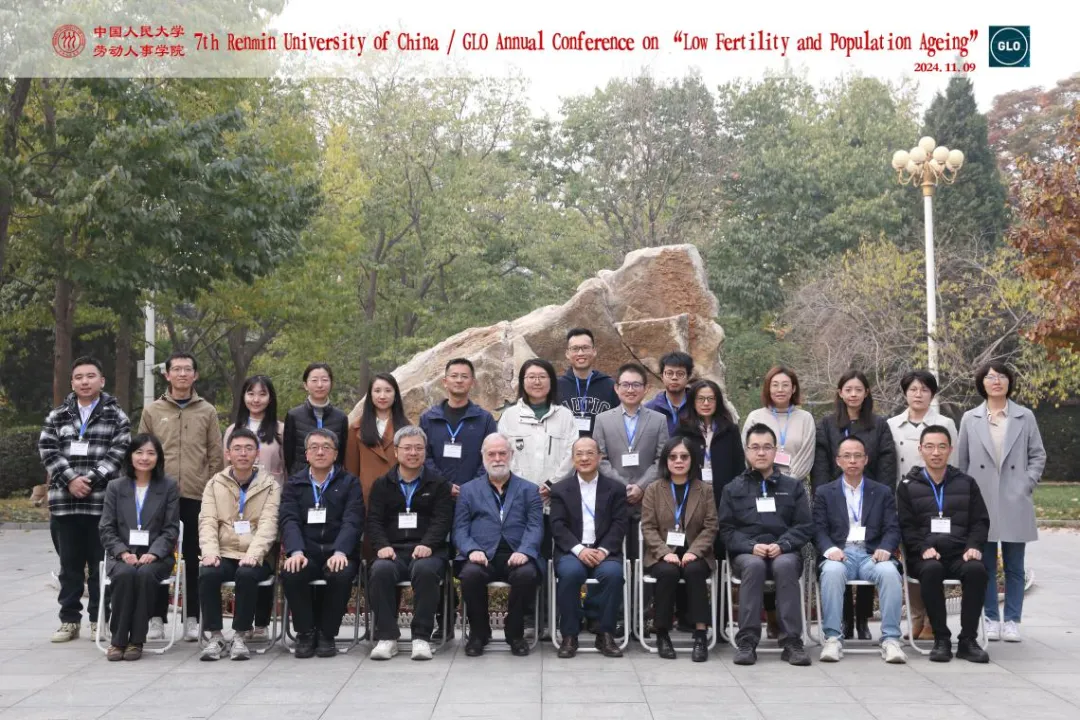
professor zhao zhong, dean of the school of labor and human resources at renmin university of china, and professor klaus f. zimmermann, president of the global labor organization, delivered speeches at the opening ceremony. professor zhao pointed out that low fertility and population ageing are critical global issues, and he welcomed experts and scholars to share their latest research on these topics, wishing the conference great success. professor klaus f. zimmermann reviewed the long-term cooperation between the global labor organization and the school of labor and human resources, and briefly introduced the journal of population economics. after the opening ceremony, the conference officially began the academic exchange sessions.
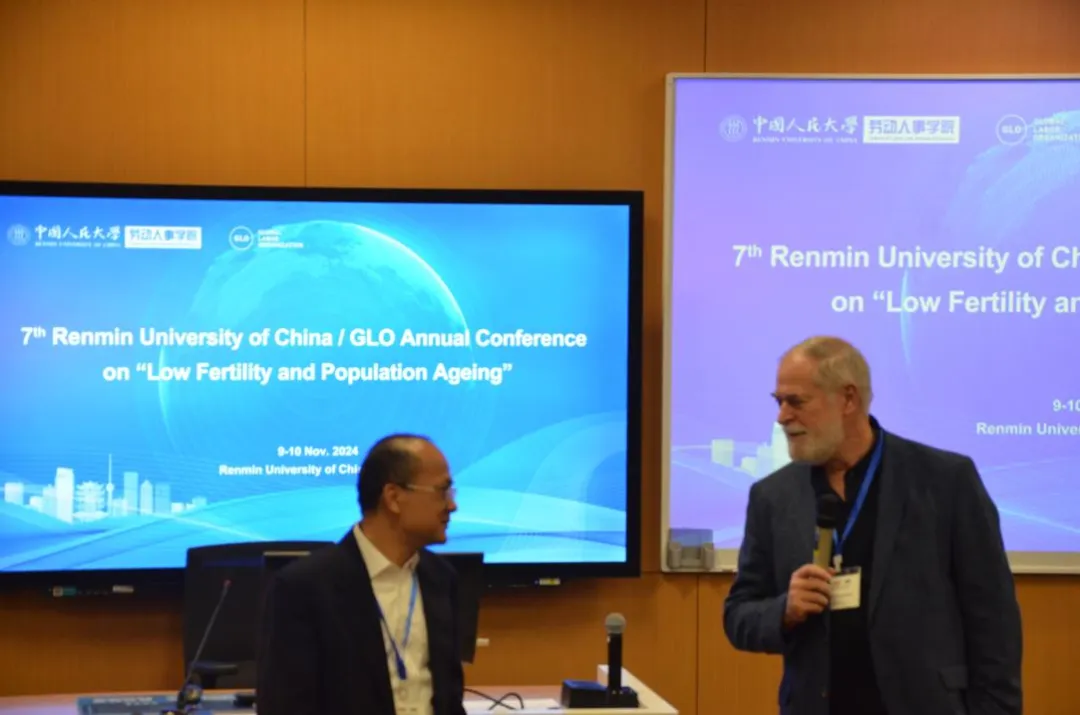
the morning keynote speech on november 9th was chaired by professor zhao zhong. professor klaus f. zimmermann, president of the global labor organization and editor-in-chief of journal of population economics, delivered a keynote address titled “the economics of fertility revisited.” the research explored the negative correlation between economic development and fertility rates across global nations, discussing the future relationship between economic development and fertility. the study suggested that the “fertility-economy” curve could potentially follow a u-shape or an inverted j-shape over the long term, but further theoretical and empirical evidence from population economists is needed. additionally, the study pointed out that despite the vast body of research on fertility, the quantity-quality trade-off theory in fertility choices is still relevant. professor klaus f. zimmermann also discussed china’s fertility policies with the attending experts and scholars.
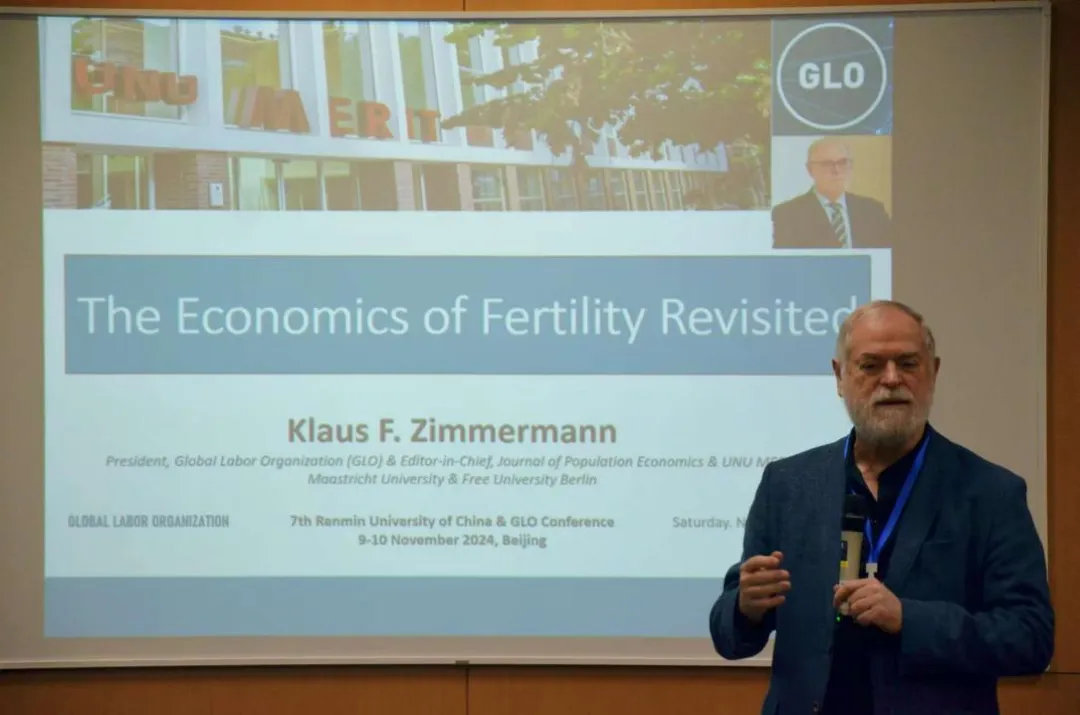
the first academic session was chaired by professor shi xinzheng from peking university. first, wang yiping, a ph.d. student from peking university, presented his paper titled “motherhood penalty and low fertility in china: a pseudo-event study.” the research found that one-third of working women left their jobs in the year of childbirth, and this penalty persisted for over eight years. heterogeneity analysis showed that the motherhood penalty increased significantly in almost every province, and regions with higher penalties saw greater declines in fertility rates. the conclusion emphasized that the increase in motherhood penalties has led to a significant decline in the total fertility rate.
next, professor shi xinzheng from peking university presented his research titled “the effect of the one-child policy on fertility in china: identification based on the difference-in-differences method.” the study found that the one-child policy reduced the likelihood of chinese women having a second child by approximately 11 percentage points, explaining 38% of the decline in second-child birth rates. this suggests that 62% of the fertility decline was caused by other social and economic factors. heterogeneity analysis revealed that the policy had a more significant impact on urban areas and on women with higher educational levels.
finally, assistant professor wang dandan from liaoning university presented her research titled “having a second child? the hidden role of local gender norms.” the study found that areas with highly traditional or highly egalitarian gender norms saw a significant increase in second-child birth rates following the “two-child policy,” while regions with more moderate gender norms showed minimal changes. additionally, an increase in women’s education level was associated with a rise in fertility in more egalitarian environments. these results highlighted the key role of cultural factors in fertility decisions.
in the afternoon, the second academic session was chaired by professor zhao liqiu from renmin university of china. first, assistant professor zhuang chen from peking university presented his research titled “temporary basic income, human capital investment, and fertility decisions: the trade-offs in household resource allocation.” the research utilized malaysia’s first large-scale temporary basic income program (bkss) to explore how unconditional cash transfers influence household resource allocation. the study found that the bkss program reduced household spending on education, especially in male-headed households. moreover, compared to households that did not receive bkss transfers, households receiving bkss transfers—particularly those with female parents—expressed a stronger willingness to expand their family size.
next, professor zhao guochang from southwestern university of finance and economics shared his research titled “urbanization and fertility revisited: evidence from china’s new urbanization policy.” the study found that the new urbanization policy significantly increased fertility levels in pilot counties. on average, the policy led to a 5.02% increase in the number of births and a 0.723‰ increase in birth rates. mechanism analysis revealed that the new urbanization initiative effectively promoted employment and entrepreneurship, increased residents’ incomes, and achieved more equitable access to public services, thus reducing concerns about the costs of having children.
finally, ph.d. student zhu hanyu from peking university presented a research titled “intergenerational impact of birth-control policies on fertility: the role of norms.” the study found that birth-control policies had an intergenerational impact on fertility rates. even after such policies were no longer in effect, they continued to lower fertility rates and affected multiple generations who were not directly impacted by the policies. the research emphasized the role of norms in shaping fertility outcomes.
the afternoon keynote speech was delivered by professor lei xiaoyan, a professor of economics at peking university and a changjiang scholar appointed by the ministry of education. she presented her research titled “how does retirement affect household portfolio choice?: evidence from statutory retirement age policy in china.” using a regression discontinuity approach, the study found that, after reaching retirement age, urban men were more likely to purchase financial products and invested larger amounts, while the amount held in liquid assets decreased. mechanism analysis showed that changes in income levels, income structure, time use, financial knowledge, and risk preferences explained 60% of these results.
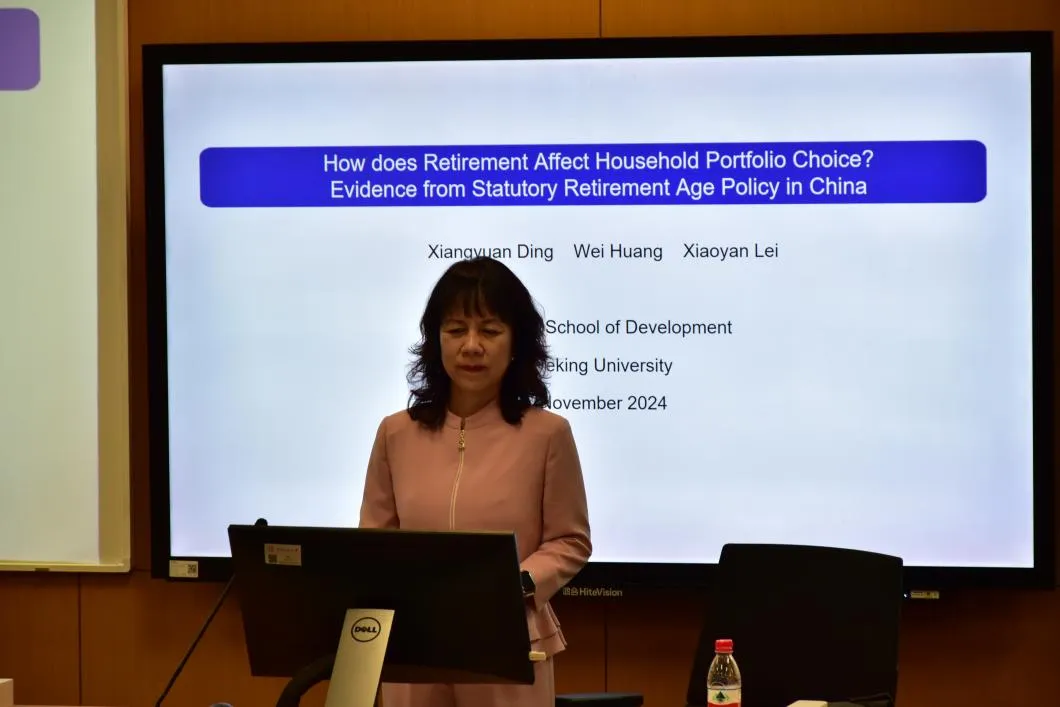
the third academic session was chaired by associate professor weng qian from renmin university of china. first, associate professor li li from east china normal university presented her research titled “the gendered effect of childhood television exposure on educational aspiration.” the study found significant effects of childhood television exposure between ages 6-10 on educational aspirations between ages 10-15. specifically, boys showed increased educational aspirations, while girls showed decreased aspirations. additionally, boys who were exposed to television between ages 6-10 had higher undergraduate enrollment rates by age 19.
next, associate professor chen yi from shanghaitech university presented his research titled “beyond the cutoff: how marginal admission to elite universities affects long-term outcomes.” the study, based on unique college entrance exam data from 1999-2003 and china unionpay data from 2013-2018, found that marginal students admitted to elite universities had lower housing expenditure in the long term. this could be due to higher peer pressure during their studies, attending less popular majors, or studying in less developed cities.
finally, assistant professor xia yiming from southwestern university of finance and economics presented a research titled “empowering low-income seniors this winter with flu vaccinations.” the study used randomized controlled trials to assess different methods for increasing flu vaccination uptake among low-income seniors. the research found that providing cost information effectively improved willingness to get vaccinated, but did not change vaccination behavior. in contrast, offering small vaccination vouchers had a significant impact on both vaccination rates and willingness.
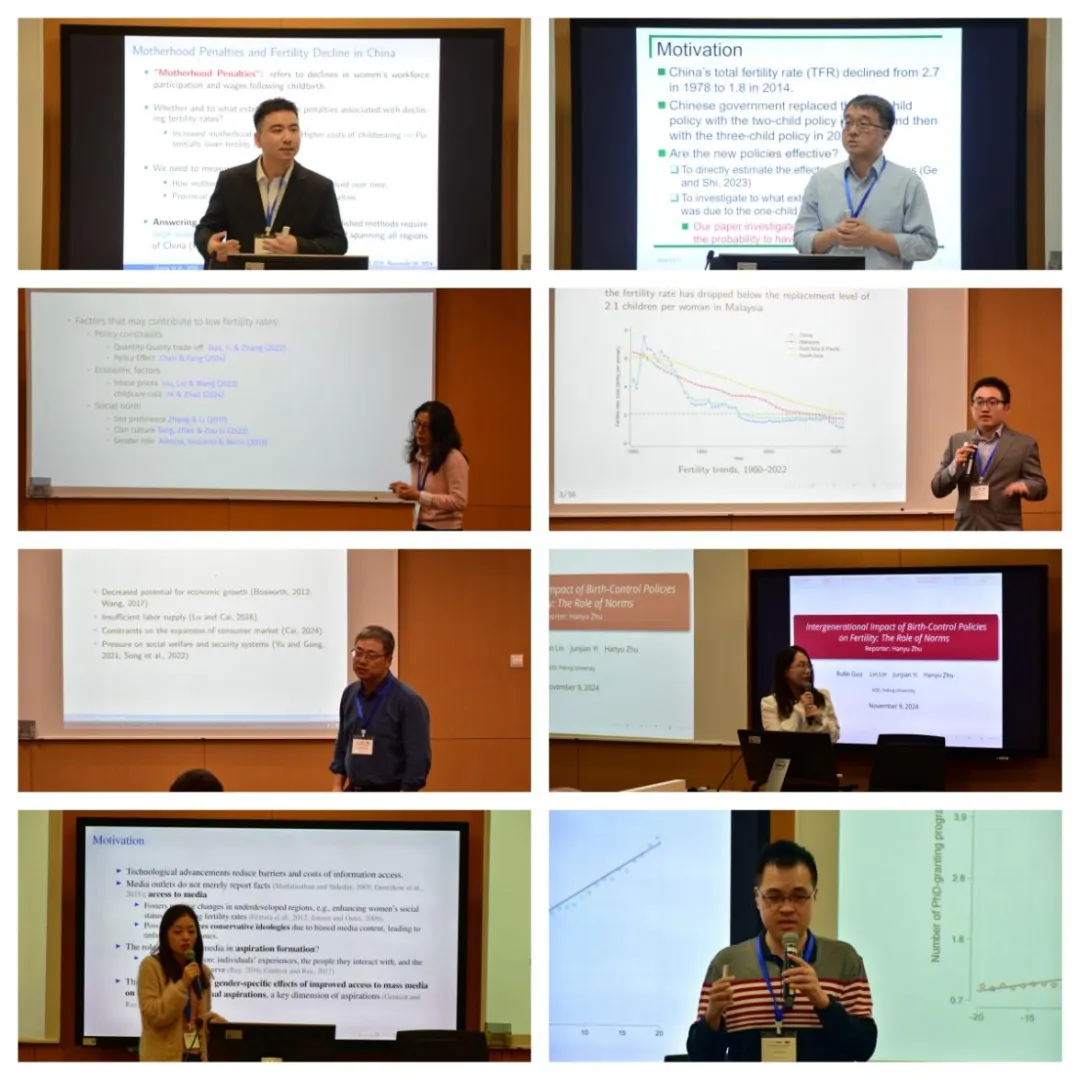
on the morning of november 10th, the fourth academic session was chaired by associate professor deng weiguang from hunan university. first, assistant professor shi xuezhuzhu from the university of international business and economics presented a research titled “the gender of grandchildren and old-age support: evidence from china.” using an interaction term between the implementation date of the gender-selective abortion ban and the gender of the first grandchild as an instrument, the study found that adult children with more grandchildren of the same gender were more likely to support their elderly parents financially. heterogeneity analysis showed that women (especially those with higher education levels living in urban areas) were more likely to provide support.
next, assistant professor chen zeyang from renmin university of china shared her research titled “nudging to save: two field experiments of china’s personal pension program.” the first experiment involved different information and financial incentives for the treatment and control groups, focusing on call completion rates and bank app usage rates. the results showed that all treatment groups had significantly higher call completion rates compared to the control group, while the group receiving only financial support had higher app usage. the second experiment focused on personalized services in the personal pension program. using machine learning, the study identified effective personalized services for heterogeneous groups, which significantly improved both call completion and app usage rates.
finally, associate professor deng weiguang from hunan university presented his research titled “occupational certifications and employability: the roles of applicant ability and job quality.” using randomized trials, the study identified the causal relationship between vocational certificates and job feedback. the research found that job applicants holding higher-level vocational certificates were more likely to receive feedback compared to those with lower-level certificates, while there was no significant difference between mid-level and low-level certificates. additionally, high-level certificates increased the job opportunity gap between applicants from different universities.
the fifth academic session was chaired by associate professor cai shu from jinan university. first, assistant professor cai shu presented his research titled “risk behaviors of only-child parents: evidence from china’s one-child policy.” the research found that only-child parents exhibited higher-risk behaviors compared to non-only-child parents, indicating a need for special attention to this group’s long-term wellbeing.
next, assistant professor jin zhangfeng from zhejiang university of technology presented his paper “the unintended consequences of relaxing birth quotas: theory and evidence.” he explored the unintended effects of the gradual easing of birth quotas and examined how policy relaxation impacted fertility behavior and economic outcomes.
ph.d. student zhang rongjie from tsinghua university followed with “intra-household bargaining and fertility decision-making,” a study that explored the decision-making process around fertility, especially the bargaining dynamics within households.
finally, ph.d. student wang yutao from singapore management university presented a paper “social institutions and low birth rates.” the research analyzed the role of institutional settings in shaping fertility decisions and the societal impact of declining fertility rates.

in conclusion, professors zhao zhong and klaus f. zimmermann gave closing remarks, thanking the organizers, speakers, and participants. the 7th renmin university-glo conference successfully concluded, marking another significant milestone in global academic cooperation.